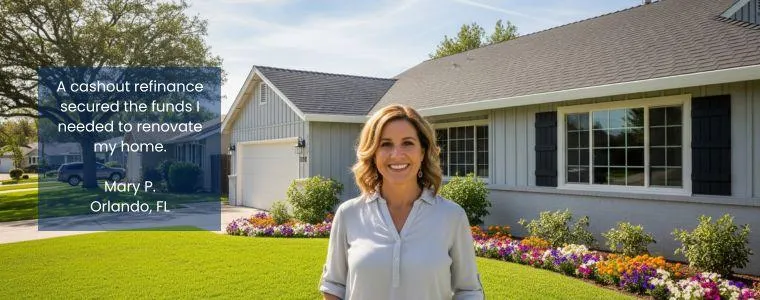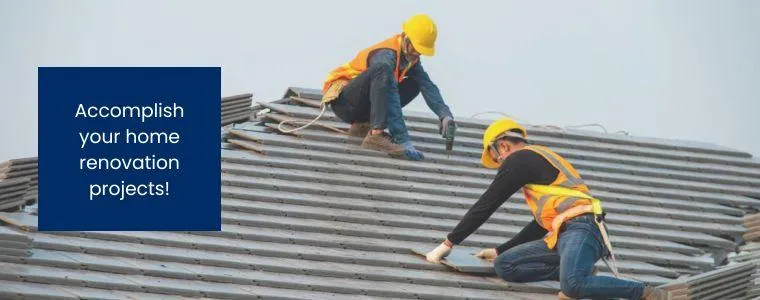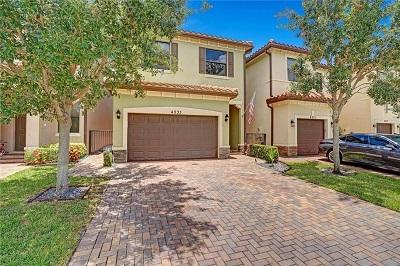Is a Home Equity Line of Credit or a Cash-Out Refinance Better
to Help Pay for a New Roof for My Home?
Replacing the roof on your Florida home isn't just a cosmetic upgrade. It is often a necessary investment. With the state’s harsh sun, heavy rains, and hurricane threats, roofs wear out faster here than in most other parts of the country. For many Florida homeowners, insurance companies are tightening their requirements, sometimes refusing to cover homes with roofs older than 15 years. Whether you are trying to stay insured, add value to your home, or prevent future water damage, a roof replacement can be a high cost project that you can’t afford to put off.
That does not make it any easier to afford. The price tag for a new roof in Florida often ranges between $14,000 to $60,000, depending on the size of your home and the type of roof and materials you would like. With that said, you, as the homeowner have to look consider what’s the best way to pay for it?
Two common options are a Home Equity Line of Credit (HELOC) and a cash-out refinance. Each offers access to your home’s equity, but they work differently—and choosing the right one depends on your financial situation, goals and current mortgage terms.

Understanding the Basics: HELOC vs. Cash-Out Refinance
A HELOC (home equity line of credit) acts like a credit card that is secured by your home. Once approved, you will have a line of credit which typically has a variable interest rate, and allows you draw funds as needed. During the draw period, which is often 5 to 10 years, you can borrow, repay and borrow again. This is why its similar to a credit card where you can easily take funds as needed. If you wind up keeping a balance after the draw period, for example, after 10 years, you enter the repayment period where the balance has to be paid down over time.
When getting a home equity line of credit, you will typically receive a monthly statement which only shows the interest that must be paid. This is a common feature, and can sometimes be looked at as a benefit, that you only have to pay interest for the first 10 years. This can vary from HELOC to HELOC, but is a common factor. It can beneficial because you don’t need to worry about paying back the entire loan amount now. As mentioned, the monthly statement will show the amount needed to pay for only the interest portion.
But, make sure you understand that if you only pay the interest, you still have the principal balance remaining and are not paying it down. To help bring down the balance, you should pay the interest and also add an additional amount to pay down the principal.
A cash-out refinance, on the other hand, replaces your existing mortgage with a new, larger loan. The difference between what you owe and what you refinance for is given to you as a lump sum of cash at closing. This new mortgage may have a different term or interest rate than your current one, and you'll begin making payments on the full amount immediately.
Both options allow you to tap into your home’s equity—essentially turning a portion of the value you’ve built into usable funds—but they come with different pros and cons.
Why It Matters for Roof Replacement in Florida
Florida’s climate makes roof quality a critical concern. Not only is a sturdy, up to code roof essential for protecting your home from hurricanes and moisture, but it’s also key to maintaining or securing homeowners insurance which is something that has been getting harder and more expensive, over the past several years, throughout the state.
Because of this, the urgency of replacing a roof in Florida may push homeowners toward financing options that can deliver the funds quickly and with as little friction as possible. But urgency shouldn't overshadow long-term financial consequences. That is where choosing between a HELOC and a cash-out refinance requires careful thought to see which makes more sense for your situation.

When a HELOC Might Make More Sense
If you have already locked in a low mortgage rate and do not want to touch your existing home loan, a HELOC could be a smart alternative. You are not refinancing your whole mortgage, and instead, you are simply adding a second line of credit based on your home’s value and equity. That means no disruption to your current loan, and you only borrow what you need.
HELOCs are particularly helpful if you are unsure of the total cost of your roof replacement or want the flexibility to cover other home improvements down the line such as a kitchen makeover, bathroom renovation or various projects around the house. You can draw only what’s needed for the project, and pay interest on that amount rather than taking a lump sum all at once.
However, HELOCs typically come with variable interest rates. If the rates increase this year, next or at any point in the next few years, your payments could also increase over time. If you are looking for predictability, and were trying to aim for a fixed payment, that could be a drawback since the interest can change.
Also, lenders can freeze or reduce HELOC limits under certain conditions such as a drop in your home’s value or changes in your credit profile. While rare, it’s something to consider if you anticipate needing the full credit line for your roofing project.
When a Cash-Out Refinance Might Be a Better Option
If you are comfortable refinancing your mortgage, and especially if your current interest rate is higher than you would like, a cash-out refinance could be more cost effective over the long term. This option will give you a lump sum of money upfront which is ideal for a project such as a roof replacement with a known cost. Since mortgage interest rates are generally lower than HELOC rates, you might save money overall, especially if you are consolidating other high interest debts at the same time.
Another big benefit is the predictability. Cash-out refinances typically offer a fixed interest rate meaning your monthly payment stays the same throughout the life of the loan. That is attractive for many homeowners, and can give peace of mind if you're planning for the long-term and want consistent housing costs.
The downside is that refinancing involves replacing your entire mortgage which may come with a bit more in closing costs since the overall size of the loan is bigger. If you already have a low-rate mortgage from the past years, refinancing now could mean trading that for a higher rate which some homeowners may not want to do.
If you a cash-out refinance does seem more appealing to you, it could also be worthwhile to consider other debts you would like to pay off. Did you have credit card balances, personal loans or possibly an automobile balance that you wanted to finish with? When doing the cashout refinance, you can discuss paying off other items simultaneously which then allows you to get the cash needed to pay off those debts, get your new roof, and have the loan be amortized over 30 years to reduce the payment.
You can read more about the Top 5 Purposes for a Cash-Out Refinance.
Florida-Specific Considerations
In Florida, where property values in many areas have risen steadily over the last decade, a large number of homeowners are sitting on significant equity. That gives you flexibility, but it also means an underwriter will be reviewing your credit, income, liabilities, and debt-to-income ratio to determine how much of that equity you can actually access.
Insurance requirements may also play a role. Some insurance companies in Florida will be more cautious if your roof is already old or damaged. Therefore, getting financing in place before your situation becomes urgent is always a smart move.
On the positive side, many homeowners will see their insurance premiums go down when getting a new roof. While there may be some costs in getting the financing in place, you may have annual savings in the near future once the new roof is in place. That is something you would want to check with your insurance agent to discuss.
Is the HELOC or Cash-Our Refinance Better for Me?
There’s no one-size-fits-all answer, but here’s a general way to look at it:
• A HELOC is typically better if your mortgage rate is low, you want flexibility in how and when you borrow, and you are comfortable with a variable rate.
• A cash-out refinance may be the better choice if you need a large, fixed sum, want a single mortgage payment, or are looking to improve your loan terms while funding your project.
Either option can help you cover the cost of a much needed roof, but the right choice depends on your individual financial picture and long-term goals.
The roof over your head is more than a structural necessity. It’s a key part of your home’s safety, value, and insurability. Specific to Florida, with the state's weather challenges and shifting insurance landscape, delaying a roof replacement can create more problems than it solves.
If you have built up equity in your home, using it through either a HELOC or a cash-out refinance is a smart way to fund the new roof for your home. Just be sure to consider the options and understand the long-term role of each option to help choose the financing path that aligns with your scenario.
For more information on these refinancing options, please contact us and our mortgage specialists will be happy to assist you.
Mortgage Insight:
Purchasing a Home with a Conventional Loan
VA Loan Success Story with Eric and Denise
How a VA Loan in Ocala, FL changed a Family's Financial Future
Can I Use My VA Loan in a Chapter 13 Bankruptcy?
Can a Fiance or Kids be on a VA Loan?
Veterans Who Buy Homes See Far Higher Net Worth Than Renters
How Much Mortgage Insurance Can I Save with a VA Loan?
What to Avoid in a Home When Obtaining a VA Loan Appraisal?
Duplex Property in Fort Lauderdale Quadruples in Value and Leaves a Nest Egg to the Heirs
How a California Remote Worker Obtained a Mortgage to Relocate to Boca Raton, FL
What's the Average Mortgage in Fort Lauderdale, FL?
What Factors are in my Credit Score for a Mortgage?
What Documents Do You Need for a No Income Verification Mortgage?
Restaurant Owner Obtains Self-Employed Home Loan
Can a General Contractor Obtain a No Income Verification Mortgage?
Is a HELOC or a Cash Out Refinance Better to Pay for a New Roof?
Can a Collection Prevent Me from Getting a Mortgage?
Do I Have to Make Mortgage Payments if I Lose My Job?
How to Rent Out Your Investment Property
What Portion of a Mortgage Payment Goes Towards Insurance

Your mortgage journey.
Various loan type options including:
Conventional loan
FHA loan
VA loan
Self-employed loan options
No income verification for investors
Benefits of Homeownership
Homeownership is a significant milestone and a decision that offers many advantages. In addition to providing a place to call your own, owning a home brings financial stability, personal fulfillment, and a sense of belonging. Mortgage Group has been helping individuals and families obtain homeownership, guiding them through the process and obtaining referrals to help their family and friends accomplish the same.

Purchase
Get pre-approved to purchase your first home, second home or upcoming investment property.
Refinance
Own a property and interested in lowering your payment? Need to take cash out? Refinance with confidence.
Connect with Us
Our experienced team with be happy to speak with you, and walk you through each step of the process.

Providing mortgage solutions to help you with your home.
Mortgages can be complicated and have many moving parts. Let our team help you!
Contact Us
It only takes a few moments to reach out and have an initial conversation.
Know the Next Steps
Our team will work with you to find the best way to achieve your home loan goals.
Find Your Home and Get Your Loan
Our team will be prepared to move with the next steps once you have secured your home purchase contract.
Houses

Townhomes

Condos

Multi-Units

Some of the areas where we have helped individuals obtain a mortgage:
Miami-Dade County
Bal Harbour, FL
Coconut Grove, FL
Coral Gables, FL
Cutler Bay, FL
Eastern Shores, FL
Fisher Island, FL
Golden Beach, FL
Hialeah, FL
Hialeah Gardens, FL
Homestead, FL
Indian Creek, FL
Miami Beach, FL
Miami Gardens, FL
North Miami, FL
North Miami Beach, FL
Pinecrest, FL
Surfside, FL
Broward County
Cooper City, FL
Coral Springs, FL
Dania Beach, FL
Davie, FL
Deerfield Beach, FL
Doral, FL
Fort Lauderdale, FL
Hallandale Beach, FL
Hollywood, FL
Lauderdale by the Sea, FL
Lauderdale Lakes, FL
Lauderhill, FL
Lighthouse Point, FL
Margate, FL
Miramar, FL
North Lauderdale, FL
Oakland Park, FL
Parkland, FL
Pembroke Pines, FL
Plantation, FL
Pompano Beach, FL
Southwest Ranches, FL
Sunrise, FL
Tamarac, FL
West Park, FL
Wilton Manors, FL
How much home can I afford?

Which home loan program is right for me?

Contact our team today.
1-800-583-5305
© Copyright 2026 E Mortgage Capital, Inc.. All rights reserved.
- 1416824 | E Mortgage Capital, Inc.
Notice To Texas Loan Applicants: Consumers wishing to file a complaint against a mortgage banker, or a licensed mortgage banker residential mortgage loan originator, should complete and send a complaint form to the Texas Department of Savings and Mortgage Lending, 2601 North Lamar, Suite 201, Austin, TX 78705. Complaint forms and instructions may be obtained from the department’s website at www.sml.texas.gov
A toll-free consumer hotline is available at 1-877-276-5550. The department maintains a recovery fund to make payments of certain actual out of pocket damages sustained by borrowers caused by acts of licensed mortgage banker residential mortgage loan originators. A written application for reimbursement from the recovery fund must be filed with and investigated by the department prior to the payment of a claim. For more information about the recovery fund, please consult the department’s website at
www.sml.texas.gov

